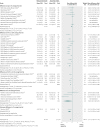Effect of reducing total fat intake on body weight: systematic review and meta-analysis of randomised controlled trials and cohort studies
- PMID: 23220130
- PMCID: PMC3516671
- DOI: 10.1136/bmj.e7666
Effect of reducing total fat intake on body weight: systematic review and meta-analysis of randomised controlled trials and cohort studies
Abstract
Objective: To investigate the relation between total fat intake and body weight in adults and children.
Design: Systematic review and meta-analysis of randomised controlled trials and cohort studies.
Data sources: Medline, Embase, CINAHL, and the Cochrane Central Register of Controlled Trials to June 2010.
Inclusion criteria: Randomised controlled trials and cohort studies of adults or children that compared lower versus usual total fat intake and assessed the effects on measures of body fatness (body weight, body mass index, or waist circumference) after at least six months (randomised controlled trials) or one year (in cohorts). Randomised controlled trials with any intention to reduce weight in participants or confounded by additional medical or lifestyle interventions were excluded.
Data extraction: Data were extracted and validity was assessed independently and in duplicate. Random effects meta-analyses, subgroups, sensitivity analyses, and metaregression were done.
Results: 33 randomised controlled trials (73,589 participants) and 10 cohort studies were included, all from developed countries. Meta-analysis of data from the trials suggested that diets lower in total fat were associated with lower relative body weight (by 1.6 kg, 95% confidence interval -2.0 to -1.2 kg, I(2)=75%, 57,735 participants). Lower weight gain in the low fat arm compared with the control arm was consistent across trials, but the size of the effect varied. Metaregression suggested that greater reduction in total fat intake and lower baseline fat intake were associated with greater relative weight loss, explaining most of the heterogeneity. The significant effect of a low fat diet on weight was not lost in sensitivity analyses (including removing trials that expended greater time and attention on low fat groups). Lower total fat intake also led to lower body mass index (-0.51 kg/m(2), 95% confidence interval -0.76 to -0.26, nine trials, I(2)=77%) and waist circumference (by 0.3 cm, 95% confidence interval -0.58 to -0.02, 15,671 women, one trial). There was no suggestion of negative effects on other cardiovascular risk factors (lipid levels or blood pressure). GRADE assessment suggested high quality evidence for the relation between total fat intake and body weight in adults. Only one randomised controlled trial and three cohort studies were found in children and young people, but these confirmed a positive relation between total fat intake and weight gain.
Conclusions: There is high quality, consistent evidence that reduction of total fat intake has been achieved in large numbers of both healthy and at risk trial participants over many years. Lower total fat intake leads to small but statistically significant and clinically meaningful, sustained reductions in body weight in adults in studies with baseline fat intakes of 28-43% of energy intake and durations from six months to over eight years. Evidence supports a similar effect in children and young people.
Conflict of interest statement
Competing interests: All authors have completed the ICMJE uniform disclosure form at
Figures
References
-
- World Cancer Research Fund/American Institute for Cancer Research. Preventability of cancer by food, nutrition, and physical activity: Appendix A. Policy and Action for Cancer Prevention. Food, Nutrition, and Physical Activity: a Global Perspective. AICR, 2009.
-
- Manson JE, Colditz GA, Stampfer MJ, Willett WC, Rosner B, Monson RR, et al. A prospective study of obesity and risk of coronary heart disease in women. N Engl J Med 1990;322:882-9. - PubMed
-
- Song Y-M, Sung J, Davey Smith G, Ebrahim S. Body mass index and ischemic and hemorrhagic stroke: a prospective study in Korean men. Stroke 2004;35:831-6. - PubMed
-
- Kelly S, Hillier F, Whittaker V, Ells LJ, Edmunds LD, Smith S, et al. The associations between food, nutrition, physical activity and the risk of weight gain, overweight and obesity and underlying mechanisms. World Cancer Research Fund/American Institute for Cancer Research, 2006 www.dietandcancerreport.org/cancer_resource_center/downloads/SLR/Obesity....
-
- Yu-Poth S, Zhao G, Etherton T, Naglak M, Jonnalagadda S, Kris-Etherton PM. Effects of the National Cholesterol Education Program’s Step I And Step II dietary intervention programs on cardiovascular disease risk factors: a meta-analysis. Am J Clin Nutr 1999;69:632-46. - PubMed
Publication types
MeSH terms
Substances
LinkOut - more resources
Full Text Sources
Other Literature Sources
Medical



